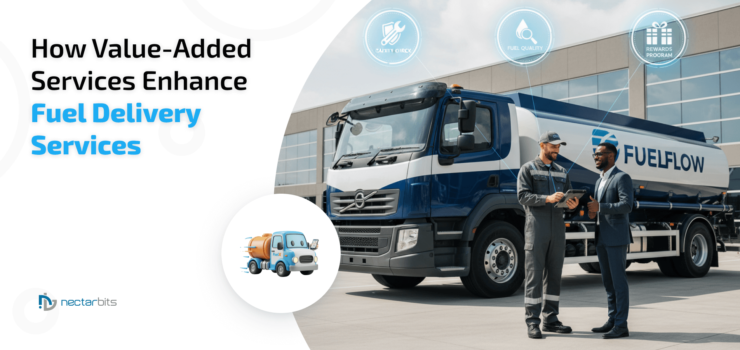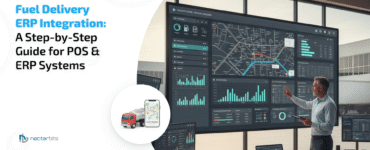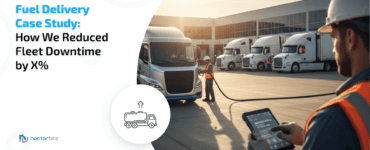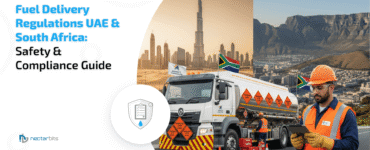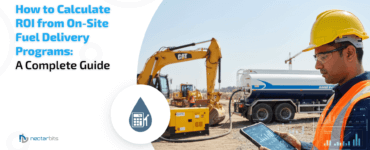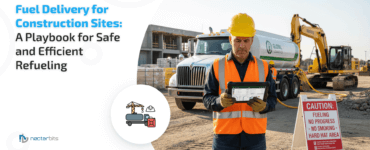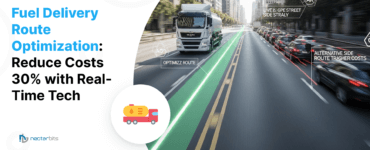In the last couple of years, the role of fuel delivery solutions has become significant in the lives of people across the globe. With the advent of AI, IoT, and autonomous technologies, the fuel delivery app is enhanced, but factors like sustainability demands and hyper-personalization have increased operational complexity. It has led the fuel delivery businesses to adopt value-added services that thrive in 2025’s competitive landscape. Let’s understand the complete scene.”
Initially, the people are happy with fuel delivery services as they are saving their time, dollars, and efforts of visiting the fuel station. However, the ever-changing customers’ expectations and increasing competition has made it important for the fuel delivery service providers to add value-added services that thrive the customers and enable businesses to survive amidst fierce competition.
Take a look at what the value-added services are:
The value-added services are the set of AI-driven and sustainability-focused features that renders the best experience to the customers after using the products and services. There is a range of value-added services offered during the whole supply chain that binds the customers to the businesses positively. They are designed in a way that meets the customers’ demands with quality maintenance and complies with standard rules and regulations.
Saying value-added services as the wishbone of the fuel delivery mobile app development is not an overstatement at all. It’s so because the additional services increase the product demand in the market, provide additional support to the businesses to seize an edge in the market, and generate additional revenue.
In 2025, these services are increasingly AI-driven, automated, and integrated with sustainability and smart mobility ecosystems.
Impressed? Willing to include the value-added services in your fuel delivery app development? If so, here we have explained the various types of value-added services that can make your fuel delivery business profitable.
Different types of value-added services that you can integrate into the fuel delivery Services business
Facilitate oil-changing services
Oil changing is an important service that vehicles need after completing a specific distance. However, the frequency at which the vehicle needs oil changing services varies according to vehicle type, the vehicle’s condition, and the distance traveled. The people who avoid oil changing services for a long time have experienced significant damage to their businesses. Here, moving to the AI-powered predictive maintenance services deters people from oil changing. The fuel delivery solutions have started offering oil changing services as value-added services at the customers’ doorstep. The providers bring all the required equipment that makes an oil change a breeze.
In 2025, some providers are integrating IoT sensors and AI to predict oil degradation, allowing proactive scheduling and even robotic oil changes in select markets.
Offer accessories to streamline the fuel delivery
The people have accessories in their vehicle that needs to get repaired after the regular intervals to extend the longevity. Also, if damaged, the customers want them to get replaced with a new one.All such things are covered in IoT-enabled accessories value-added services offered along with fuel delivery services.
The fuel delivery business provides the accessories like- smart fuel caps with IoT sensors, nozzle, fuel pipe, and others.Also, the providers sign an annual maintenance contract with the business to get the accessories repaired continuously at optimal charges. It creates an extra avenue for earning.
Give them a fuel card
Let’s accept it: people love plastic cards everywhere, be it making payments, handling loyalty points, and others. The fuel delivery applications adopting the latest trend can offer the fuel card to businesses as part of the loyalty program.
The loyalty points earned by the customers on every fuel order get recorded on the fuel card. The improved loyalty points motivate the users to order the fuel repeatedly from the same application. In addition to repeat purchases, the fuel card facilitates cashless payment, security, digital invoice, no chances of the fraudster, and others.
Provide car wash services
Car wash service is an integral part of the car maintenance services that every car owner needs, but finding a reliable car wash service provider and taking the car to the service place is quite a task. Thanks to fuel delivery apps that provide car wash as a value-added service. The apps offer a wide range of car wash services using no water or harmful chemicals that affect the car’s body. The service helps in increasing the lifespan and usability of the car and keeps the car shining as it was purchased on day one.
Win the trust with after-sales support
You might be puzzled about what services the fuel delivery app can provide to its customers after completing fuel delivery requests. The after-sales support includes- warranty of accessories supplied, repair for the value-added services, if they are damaged, AI chatbot assistance for 24/7 support, upgrading the system, and more. The customers can get the benefit of all of them.
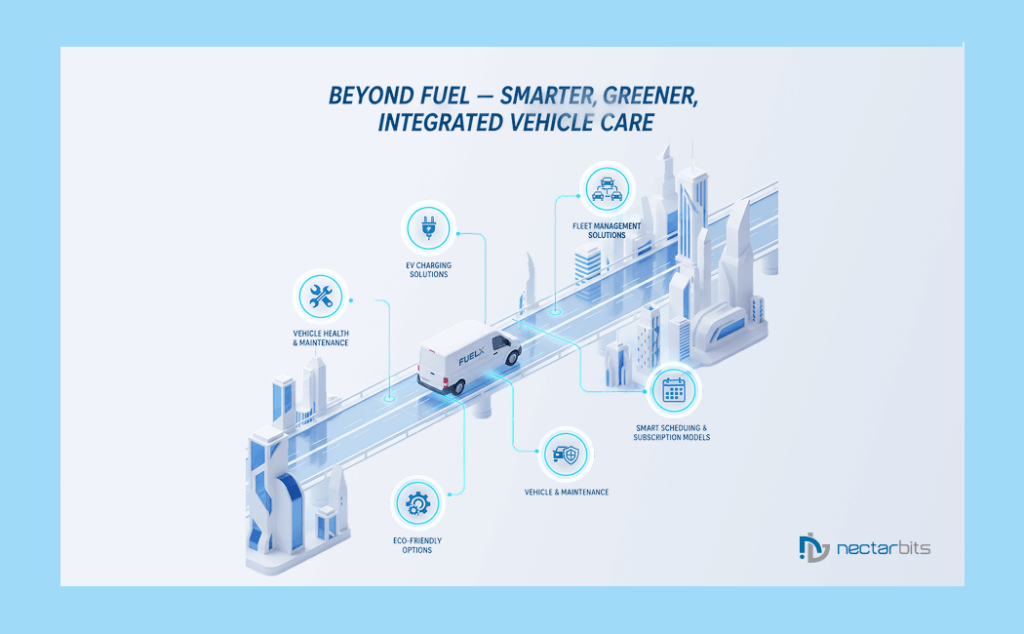
Emerging Value-Added Services to Integrate into Your Fuel Delivery App:
1. Electric Vehicle (EV) Charging Solutions:
With the global shift towards sustainable energy, integrating EV charging is a forward-thinking move.
- Mobile EV Charging: Offer on-demand mobile charging services where a service vehicle equipped with a portable fast charger can come to the user’s location to provide a quick boost. This is especially valuable in areas with sparse public charging infrastructure.
- Battery Swapping Services: For commercial fleets or specific vehicle models, providing a battery swapping service can be a significant time-saver and a unique selling proposition.
2. Comprehensive Vehicle Health and Maintenance Reports:
Leverage technology to offer customers deeper insights into their vehicle’s condition.
- On-Site Diagnostics: Technicians can perform on-the-spot vehicle diagnostic checks using OBD-II scanners. This service can identify potential issues, check engine light causes, and monitor the overall health of the vehicle, providing a detailed report directly through the app.
- Tire Inflation and Inspection: A simple yet crucial service, technicians can check and inflate tires to the recommended pressure during a fuel delivery stop, improving fuel efficiency and safety for the customer.
3. Eco-Friendly and Sustainable Options:
Cater to the growing environmentally-conscious consumer base.
- Carbon-Neutral Fueling: Partner with carbon offsetting programs to offer customers the option of a “green” fuel delivery. For a small premium, the carbon emissions from their fuel purchase can be offset through investments in environmental projects.
- Biofuel and Alternative Fuel Delivery: Depending on market availability and demand, expand your offerings to include biofuels or other alternative fuels.
4. Advanced Fleet Management Solutions:
For B2B clients, offer a suite of services designed to optimize their fleet operations.
- Telematics Integration: Sync with existing fleet management software to automate fuel ordering based on vehicle data and fuel levels. This reduces downtime and manual administrative work.
- Bulk Fuel and Diesel Exhaust Fluid (DEF) Delivery: Provide scheduled and on-demand bulk fuel and DEF deliveries for commercial trucks, construction equipment, and generators.
5. Smart Scheduling and Subscription Models:
Enhance convenience and customer loyalty through intelligent ordering options.
- Predictive Fueling: Utilize AI and machine learning to analyze a customer’s driving habits and predict when they will need a refuel, offering to schedule a delivery in advance.
- Tiered Subscription Plans: Introduce subscription models that bundle fuel delivery with a selection of value-added services (e.g., a monthly car wash, seasonal tire pressure checks) for a flat fee, creating a recurring revenue stream.
By incorporating these new trends, your fuel delivery app can evolve from a simple convenience to a comprehensive vehicle management solution, significantly broadening its market appeal and competitive edge.
The Business Benefits Of Complementing The Fuel Delivery App Development With Value-Added Services
Improved customer acquisition
Undoubtedly, the value-added services deliver a wow experience to the customers and nurture relationships with them customers. The happy customers certainly share the good experience with the people in the circle, which means the value-added services encourage more people to download the app and start using the services.
Also, the app’s marketing team can use the value-added services as the USP which address the challenges that customers are facing and reflects the brand value. The customer analytics tool help in knowing which value-added services are performing to the notch and how customers are reacting to it. The data collectively helps in increasing customer acquisition.
Generate high profits
Using the same fuel delivery app with little enhancements enables the business to keep the existing customers engaged with the app and increase customer acquisition. The fuel delivery service provider can either extend the services or partner with third-party service providers that provide value-added services such as car washing, oil changing, and others. Without spending bundles, the userbase is increased, which in turn, uplifts the sales and revenue.
Ensure product differentiation
In the blood-thirsty competition, with wafer-thin margins, it’s difficult for the fuel delivery businesses to play catch up with the big fishes in the pond and stay ahead of the pack. The value-added services can turn the impossible thing to possible for the fuel delivery business.
Also, the fuel delivery business provides prime memberships to the customers that offer extra privileges to the prime members in exchange for a fixed amount. It delights the customers and creates value for the brand.
Regulatory & Compliance Updates for 2025
As on-demand fuel delivery expands globally, 2025 brings tighter rules around carbon neutrality, data privacy, and automation safety.
1. Carbon Neutrality Laws:
The EU’s Carbon Border Adjustment Mechanism (CBAM) moves into full enforcement by 2026, requiring digital fuel platforms to track and offset emissions. Leaders like Booster and Filld now partner with certified carbon-offset programs.
2. Data Privacy Regulations:
Global enforcement of GDPR, CCPA, and India’s DPDP Act demands stronger data security. Apps must adopt end-to-end encryption, user consent tools, and data anonymization to stay compliant. Cafu (UAE) has already implemented GDPR-style consent systems.
3. Safety Certifications:
With automation rising, FAA, NHTSA, and EASA now define standards for autonomous and drone-based fuel delivery. Businesses testing robotic fleets must gain certification and enable incident reporting and real-time compliance tracking.
Boost customer loyalty
The fuel card kind of value-added service improves convenience as the customers can keep track of the loyalty points like- the total loyalty points, when they are redeemed, and how much the customers have right on the mobile. It strengthens the loyalty program and builds an army of loyal fans.
The ‘something extra’ with value-added features gives a sense of getting perks at no cost. It makes the customers consistently use the app for fuel delivery and other value-added services.
Engage the customers with hyper-personalization
The value-added services can perform better if the services are offered to the customers based on the purchase history and browsing patterns. That’s where personalizing the services before offering them to the customers is a good choice.
The targeted value-added services are offered in the form of personalized offers that attract new customers and retain the existing ones. There are various ways to implement the same such as rewarding the customers or sending a ‘Thank You’ note for sharing the feedback on social channels.
Build the brand
The value-added services help in building the brand to makes its presence felt in the market. There are two ways to make it done. First is you can interview the customers and upload it to YouTube channel to tell your brand story from the positively influenced customers, which impress other customers.
The second way is to build a community of the existing customers on different social channels and ask the community members to post the experience on the channels.
Summing it up
The world is ever-changing and technologies are continuously advancing to meet the changing needs of the customers. The fuel delivery service is the best instance of it, which have started mushrooming to meet anywhere, anytime fuel delivery needs of the customers. As the fuel delivery need is evolved, the companies are forced to meet the requirements through value-added services introduction.
Maintaining a pace with the emerging needs of the customers has helped the companies to generate extra revenue. With passing time, we expect to see more value-added services complementing the fuel delivery applications. Stay tuned to us for knowing the more additions to the value-added services.
Conclusion
Integrating predictive analytics, digital fuel cards, and subscription-based models can boost efficiency, revenue, and loyalty. Subscription plans now drive 28% of transactions and deliver 3.5× higher lifetime value, while IoT and blockchain improve accuracy by up to 40%. With the market set to reach $12.8 B by 2033, embracing AI, IoT, and recurring revenue is essential for fuel delivery apps to lead in 2025 and beyond.

Frequently Asked Questions (FAQs)
Subscription plans allow customers to schedule recurring fuel orders—weekly, monthly, or tailored to fleet needs—at discounted rates. Subscribers benefit from automated deliveries that match their usage patterns, predictable billing, and priority service slots without placing individual orders each time.
Yes. Digital fuel cards leverage secure encryption and, in advanced platforms, blockchain authentication to record each transaction immutably. This ensures fraud prevention, instant e-invoice generation, and data privacy, making them safer than traditional payment methods.
Many modern fuel delivery apps integrate IoT sensors that measure fuel quality parameters—such as contamination levels and temperature—during transit. The data is sent in real time to your app dashboard, allowing you to verify quality before acceptance.
Emergency roadside refueling services are available 24/7. Simply request “emergency fuel delivery” through the app, and a nearby service vehicle equipped with fuel and maintenance tools will be dispatched immediately, ensuring you’re never stranded.


